Everything everywhere all at once
Dr Francesca Lim is the Chief Medical Officer at the Advanced Cell Therapy and Research Institute, Singapore (ACTRIS), a Senior Consultant Haematologist at Singapore General Hospital (SGH) and a senior member of MOH’s Clinical Services Strategy for Cell Therapy Committee, where she contributes to the development of the national cell therapy services strategy.
Cell and gene therapies (CGT) are the latest revolution in clinical care of non-curable diseases enabled through state-of-the-art manufacturing technologies. Over the past five years, there has been an exponential growth in the CGT ecosystem of Singapore. For example, as of September 2022, there are at least ten clinical trials for CGTs in Singapore’s public healthcare system with at least another five to ten trials in the pipeline. Recently, two major pharmaceutical companies obtained marketing approval for their CGT assets to treat blood cancers.
To meet the increasing demand, ACTRIS has developed a three-pronged approach to be a national enabler for CGT that will enable access to life-saving therapies for local and regional patients. One of its upcoming milestones this year will be the opening of the ACTRIS state-of-the-art cell therapy process development and manufacturing facility.
Read on to find out more about her dynamic role in leading these initiatives, the many hats she wears and how she stays joyful above it all.
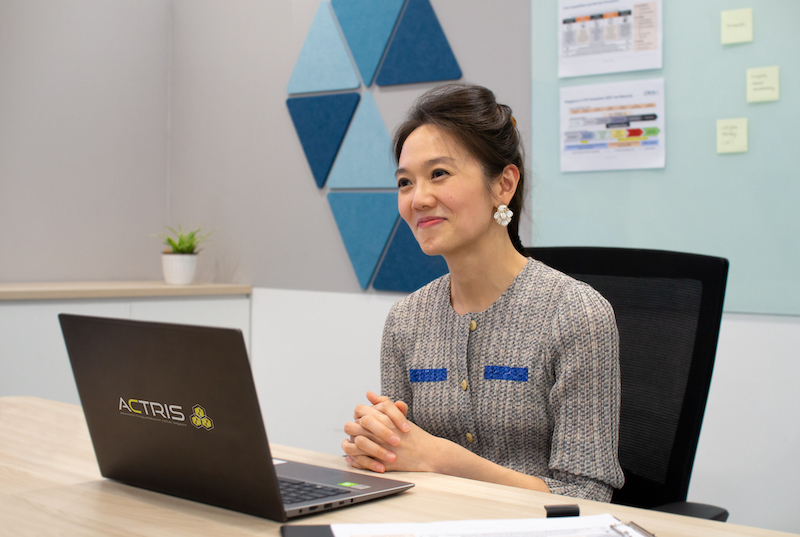
On Monday mornings, Tuesdays, and Thursdays, Francesca conducts patient consultations at SGH. She then attends to matters at the SingHealth Duke-NUS Cell Therapy Centre (SDCT) on Monday afternoons. Wednesdays are designated for discussions with her team at ACTRIS. Her Fridays are dedicated to responsibilities at the Cell Therapy Facility of the Singapore Health Sciences Authority (HSA-CTF), which is the current national-level facility that is slated to merge into ACTRIS. It is common for her to make return visits to the hospital during the weekends to attend to patients.
Sometimes, she finds herself everywhere all at once.
“If not for the complementary nature of my roles, I do not think it would be possible to do all of this,” Francesca exclaims with a wide smile.
In 2021, she was appointed as the Deputy Head of SDCT. The following year, Francesca was promoted to Senior Consultant of Haematology at SGH, where she has served for 17 years. She then became Assistant Medical Director at the HSA-CTF in 2020. Later in 2022, she assumed the role of Chief Medical Officer (CMO) at ACTRIS.
As a medical student, Francesca quickly realised she had an aptitude for patient communication and could present their ailments to her supervisors well. This led to a deepening passion for the profession. Naturally inclined to patient-centred healthcare, she chose to pursue her housemanship at SGH because of its diverse patient population. The transition from a student to practising doctor was challenging, but she recalls that time as a period of determination and growth.
“I realised Haematology was a very interesting topic. The patients whom I engaged with varied and not in just the diseases they had but how they felt about their diseases and the will to want to continue fighting against their cancer. My interactions with them deepened my passion in pursuing the subject,” she shares.
Her mentor, Prof William Hwang, the current CEO of National Cancer Centre Singapore, would later send her to the MD Anderson Cancer Center in Texas to explore Chimeric Antigen Receptor (CAR) T-cell therapy. With an opportunity to develop her interest further, Francesca spent two years researching CAR-T and CAR-NK cell therapies at the centre.
Since her return, she has been instrumental in coordinating the clinical, research and translational aspects of the Cell Therapy Programme at SGH. Her stint at MD Anderson eventually led her to become the Chief Medical Officer at ACTRIS last year. With an increase in clinical demand for CGT manufacturing in Singapore, Francesca is heartened that there is greater understanding and support for the landscape which has “revolutionised cancer medicine today”.
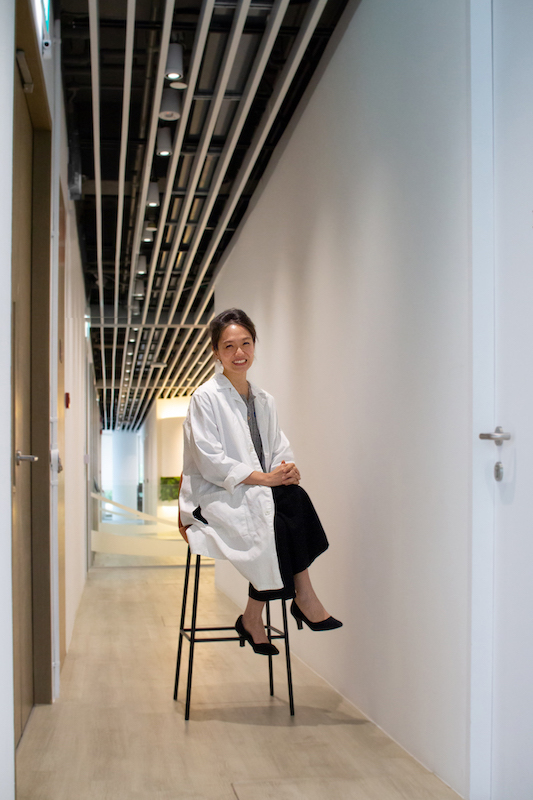
From struggling student to blossoming leader
“Everything that you have experienced makes you who you are today.” This is a statement she firmly believes in.
Despite her many accomplishments, Francesca admits that she “was not the brightest spark growing up”. With two elder sisters who excelled academically, her poor performance at the GCE-O Levels would have been a distressing blow to any student then.
“I scored 22 points,” she recounts and bursts into laughter, “I kept asking myself where I was going to go?” That became one of the pivotal moments in her life.
Her parents decided for her to study overseas, where a reduced emphasis on academic results might benefit her, mentally and emotionally. This decision, which she recalls with gratitude, not only made her more mature but also gave her a chance to view things from a broader and more diverse perspective.
“You develop confidence in an environment where everyone is unique and feels valued,” she says.
The experience would later translate to her leadership at ACTRIS. As the CMO, she places a strong emphasis on respect and trust. She values listening and respecting everyone’s opinions, believing that it fosters an environment where “if the team trusts you, they will share their concerns openly, be it for themselves or for ACTRIS as a whole”.
This rings true for the team as they gear towards their biggest project yet, building a centralised state-of-the-art facility which will comprise a Good Manufacturing Practice (GMP) Facility and a Good Tissue Practice Facility. The new facility will serve to meet the increasing demand for CGT products process development, manufacturing and related translational research in Singapore and the ASEAN region.
The building of this lab posed a new set of challenges for Francesca and her team because not only did it require absolute compliance with GMP processes, they also had to be attentive to every minute detail. “We were very aware that having a robust quality system is paramount for the lab,” she says as she recalls the many back-and-forth discussions regarding the maintenance of pressure in the clean rooms. Without prior experience in building a lab, she acknowledges that “the importance of maintaining differential pressures for the rooms to be functioning was something new to her.”
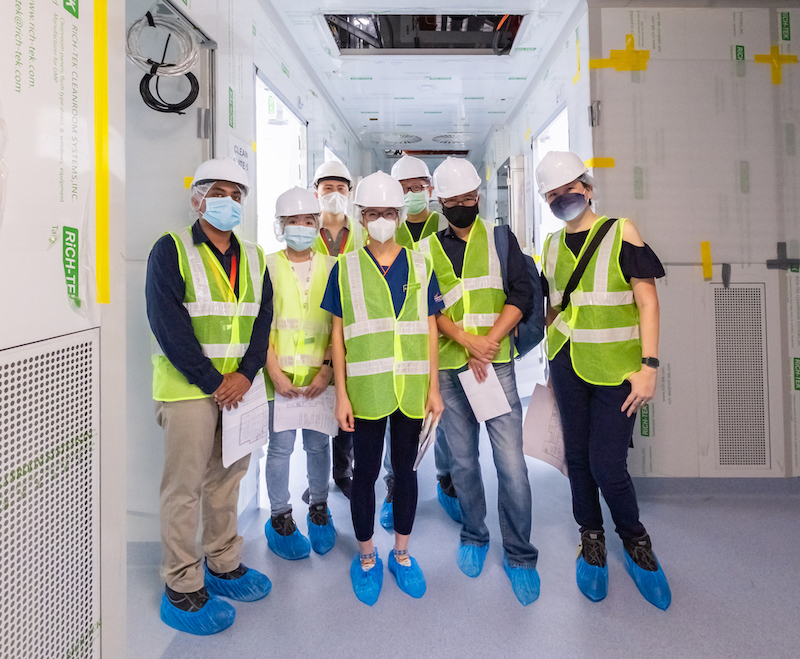 Francesca and the ACTRIS team checking in on the facility construction in July 2022
Francesca and the ACTRIS team checking in on the facility construction in July 2022
In these situations, Francesca applies the same approach by engaging with her team through active listening. This allowed for ACTRIS, key management, the quality team, consultants, and contractors to have open discussions, bring their expertise to the table and work towards their common goal.
Everything coming together: What’s next for ACTRIS and her as a mentor?
Through the various transitions in her career, it became evident to her that things would fall in place naturally, if the work was put in. With her background in stem cell transplantation, moving into the CGT landscape was a “no brainer”.
“Essentially, Prof Hwang had this vision to create a national enabler for CGT in Singapore. Hence, I do see it as my duty to the clinical teams and to our nation, to carry out that vision by implementing the CAR-T clinical programme and develop the system further,” she adds.
That vision later translated to her role in the SDCT as the Deputy Head, facilitating research collaborations and exchange of ideas. Over time, she realised her clinical expertise and CGT research were complementary, allowing her to develop cutting-edge therapies for her patients.
Presently, the team at ACTRIS is working to support local researchers, clinicians and biotech companies to bring forward their cell therapy assets to patients by providing process development, manufacturing and product characterisation services. While awaiting for ACTRIS’ own facility to be operationally ready by end of 2023, many of the day-to-day activities are carried out by HSA-CTF as well as the National University Hospital’s Tissue Engineering and Cell Therapy (NUH-TECT) laboratories, both of which will wind down operations and merge into ACTRIS as a single entity over the next couple of years.
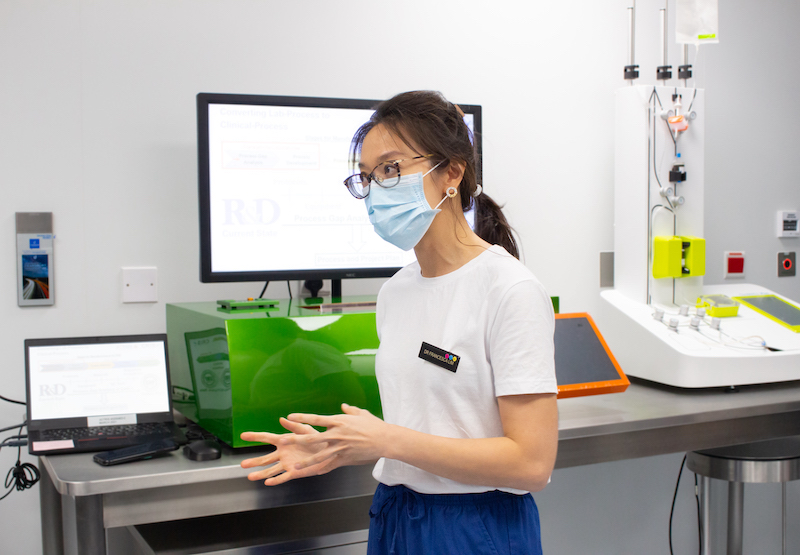
Hence, the flow of communication, from the researchers who conceptualised the initial idea to the clinicians administering the treatment, would give Francesca a comprehensive view of the entire process, allowing her to identify potential bottlenecks, together with the ACTRIS team, with the eventual goal to improve patient outcomes.
She envisions ACTRIS as a “hub-and-spoke” mechanism which would eventually position Singapore as a centre for excellence for clinical utility and manufacturing for CGTs; assisting other countries who are keen to embark on their CGT landscape to treat patients. This would bring her full circle in her journey – a young medical graduate with a passion for patient-centred care.
In addition to advancing CGT research, ACTRIS is focused on talent development. While mentoring new clinicians, Francesca sees the importance of addressing their concerns and fears to “create an environment where they can thrive and take on new responsibilities”.
As a mother of four, she recognises the delicate balance of guidance and letting go. She strives to nurture the potential of her mentees and hand over the reins to the next leadership, whom she hopes will perpetuate the same values she had cultivated. “Ultimately, they should give their best to get the job done. That’s the most important thing because back then, I gave my best as well.”
Being a clinician and a mother
As a clinician and mother, Francesca navigates a delicate balancing act. She reminds herself consistently to invest in her family, as much as she invests in work. When asked how she was able to manage all her responsibilities, she attributes this to having a strong support system.
With the guidance of her mentors and colleagues, as well as her family’s unwavering support, she has been able to thrive in both her career and motherhood. For her patients undergoing CAR-T therapy, there is a series of processes which includes holding family conferences, explaining the toxicities, gathering their consent, and monitoring their progress. “I am thankful to have the nurses and social workers assisting me. Having that support makes me comfortable and confident in what I’m doing,” she adds.
Francesca reflects on advice for women juggling multiple responsibilities: “There is much more support and understanding now. Don’t let the fear of perceived bias hold you back. Whether you have children or are expecting, know that you are competent enough to do your job well.”

During her training at MD Anderson, she had three children in tow. Despite her work, she still wanted to be by their side. With the help of her research colleagues who took turns caring for them, her husband who visited whenever he could and her parents who flew upstate to lend a hand, she was able to manage it all. “If the work and support are present. Believe in what you’re doing and do it,” she adds.
Ultimately, Francesca’s journey serves as an inspiring example of how it is possible to navigate life’s obstacles with a passion for what you do, determination and placing trust in the people who support us, while still finding joy in the meaningful moments.
Asked about the one thing that makes her smile, she beams even brighter.
She reflects: “Witnessing my patients who despite their struggles, remain grateful for each day they have to live. Those moments are very gratifying.”
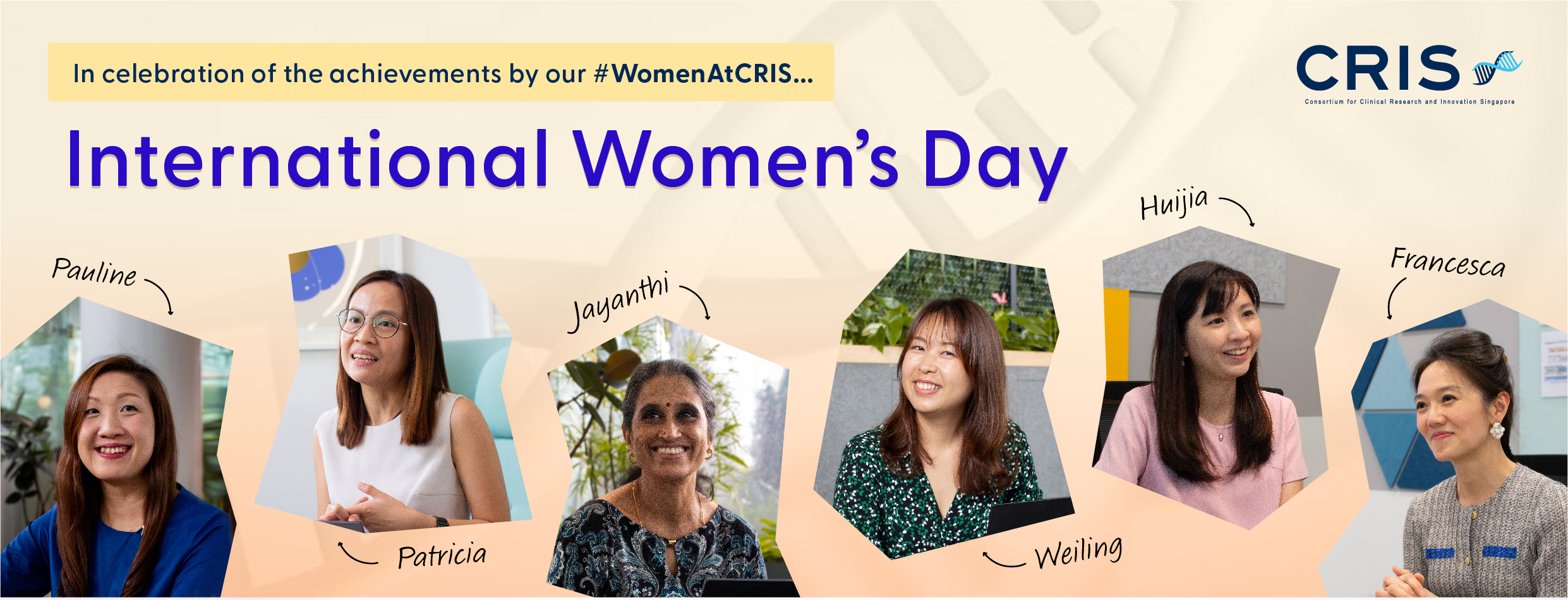
Click here to read more articles in this series.

